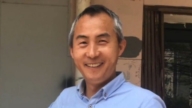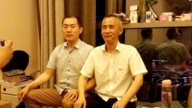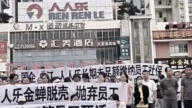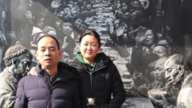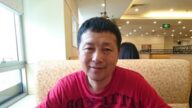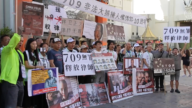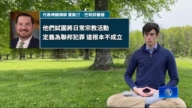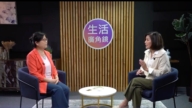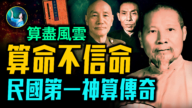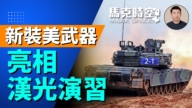【新唐人2012年7月30日讯】江苏省南通市辖下的启东市污水排污工程风波,在当局宣布永久中止工程之后,示威活动有所缓和,民众表示,市政府附近仍继续戒严。28号当天下午,当局从无锡、苏州、常州三个地方调去了2万名军警,进驻启东,镇压抗议民众,据传已经有一百多人被抓,大多数是学生。官方还散布抗议民众是“ 暴民”的论调,对此,评论认为,这是对“民权运动”的污蔑。
《日本共同社》引述江苏省日资造纸厂“王子造纸公司”母公司的消息说,28号因启东大规模抗议排污工程而停工的纸业工厂,计划7月29号恢复生产。
另据微博传出来的消息,从无锡、苏州、常州三个地方过来约2万多名武警和防暴大队,已经进驻“启东中学”。截至目前,至少有一百多人被抓,其中大多数都是年轻的学生。据传有三人死亡,包括一男一女两名大学生。
7月29号,警方在启东市内发通告,声称按“上级要求”,前一天的示威属于非法,要严厉打击组织和参加游行示威的民众。同时,网络相关消息已被迅速删除,各大微博禁止搜索关键词“启东”。境内外媒体记者被要求所有报导要跟《新华社》通稿保持一致。
启东学生:“我爸妈都是单位的嘛,他们都要求不能去。我爸妈叫我不要去, 其实我也挺想去的。好像说今天再去就要逮人了,就要抓人了。”
启东市民强烈反对的排污项目,是日本“王子纸业公司”自2007年开始建设的中国工厂,据报导,这家工厂全面启动后,每天的污水排放量将达到15万吨。民众多次向政府请愿没有结果,最终酿成了这次冲击市政府大楼的万人示威。
北京宪政学者陈永苗认为,启东环保示威出现了几个在大陆抵抗史上新鲜的元素,如剥光市委书记衣服,给他套上“强烈抵制王子排污”的衬衫,把避孕套,名酒、名烟等内部腐败,暴露于公共视野之下等。
北京宪政学者陈永苗:“体现了真正的人民的势力,以前都是喊什么对话,那么我们今天在政治符号上,政治意义上能够强迫他。我觉得这是在维权运动中出现的一个新的变化。表示我不害怕,我不恐惧你(中共),我能来去自如,我觉得它这种变化隐含了作为一个公民心理的一个变化。他(人民)已经有主动权了。”
另外,与早前四川甚邡反对钼铜项目一样,8、90后学生发挥了重要的作用。这次集会就是启东近万名中学生通过QQ和社交网站发起的,获得广泛响应。
陈永苗:“他们在读中学的时候,就已经像过去的大学生一样感觉到巨大的社会压力,社会的腐败,不公,或者是社会的三座大山各种因素,实际上已经渗透到他的中学校园里面了。”
不但启东民众强烈反对日资制纸厂的污染项目,当地警察也多私下支持反污染行动。参加游行的网友28号上午在微博说:“这事想镇压的话,只能请外援了”。
在民众巨大的抗议声浪面前,28号抗议当天,启东警方通过微博发布消息,南通市政府决定永久取消“ 南通排海工程”。
启东民众取得的胜利引起社会广泛关注。但也有批判声音说:民众是暴民,对此,网友予以怒骂。陈永苗也驳斥说,所有这些“民权运动”都是在捍卫民众自己的权利,不应该被攻击和妖魔化。
采访/李倩倩 编辑/许旻 后制/黎安安
Official Repression Starts Over Qidong Mass Protest
Mass protests against a polluting sewage discharge project
were alleviated in Qidong under Nantong, Jiangsu Province.
This was after local authorities
announced a permanent suspension.
However, martial law still continues around
the city hall, according to local residents.
On July 28, a 20,000 strong police force entered
Qidong from Wuxi, Suzhou, and Changzhou cities.
Sources said that over 100 protesters were
arrested, with the majority being students.
Officials intentionally circulated
descriptions of “mobs” over the internet.
This were refuted as slander of the “civil rights movement,"
according to the comments.
Japan’s Kyodo news agency reported production
at a Japanese-owned paper mill in Qidong was suspended.
This occurred on July 28, due to outbreak
of local mass protests against pollution.
Production would be resumed
on July 29, said Kyodo news.
News posted on Chinese micro-blogs revealed
that over 20,000 armed and ranger police are stationed in the Qidong Middle School.
They were dispatched from Wuxi, Suzhou and Changzhou.
At least 100 people were arrested,
with most of them being young students.
According to sources, three were killed, including
one female and one male university student.
On July 29, mass protests staged the day before
were declared illegal by Qidong police authorities.
This instruction was “according
to the higher-level instructions”.
The announcement proclaimed participants involved
in the demonstrations would be severely punishments.
All related online messages have been removed.
The keyword “Qidong” was banned
from being searched on the microblogs.
All Chinese media coverage was required to stay
in line with the script issued by Xinhua News Agency.
Qidong student: “My parents workplace
prohibited their participation.
They also didn’t allow me to attend,
but I actually really want to go.
It was said that people who attend the protest
today would be subject to arrest.”
The focus of the strong public opposition in Qidong
is a plant parented by Japan’s Oji Paper Company.
The factory’s construction was started in 2007, and
its daily discharge will reach 150,000 tones of sewage when fully operational, according to the media reports.
Repeated mass petitions to local
authorities were unsuccessful.
The demonstration, involving tens of thousands
of local residents eventually erupted in the occupation of a government office building.
Chen Yongmiao, a Beijing-based constitutional scholar,
noted there have been changes in Qidong’s mass protest.
This included stripping the clothes off the Party chief;
And the mayor were put on a T-shirt with printed
words “Strong Boycotting Oji Pollution”;
It publicly exposed the condoms, brand-named tobaccos
and liquors that were found in the office building.
Chen Yongmiao: “This protest embodies
the true wisdom of the Chinese people.
In the past, civilians would appeal
for a dialogue with the authorities.
Today, the protesters dared
to confront the officials politically.
I term it a new change in the rights defense movement.
It meant ‘I don’t fear you (the CCP)’.
It implies a mentality change in Chinese citizens, I feel.
They have had the initiative.”
Students born in 1980s and 1990s
became the main force of the Qidong protests.
They played the same role as their peers in Shifang’s
mass protest, staged in early July in Sichuan Province.
Nearly 10,000 Qidong high school students initiated
the demonstration through QQ and on social networking sites, gaining extensive responses.
Chen Yongmiao: “These high-school students had
experienced huge social pressures.
These pressures were usually confronted
by university students in the past.
These included such things as corruption,
social injustice, or the burden of paying for education,
medical services, and housing, which have
all penetrated into the reality of their campus life."
Even local police privately supported
the anti-pollution protest.
A local resident confirmed this in his micro-blog.
“The authorities’ crack-down sought police forces from other places.”
Under strong public opposition on July 28, Qidong police
announced in its official micro-blog that Nantong authorities decided to cancel the project permanently.
The victory for Qidong citizens has aroused widespread public concern.
They were also labeled as “the mob” by voices online.
Chen Yongmiao refuted this talk saying that
all these “civil rights movements” were the Chinese people
defending their own human rights, which should not be verbally attacked and demonized.


